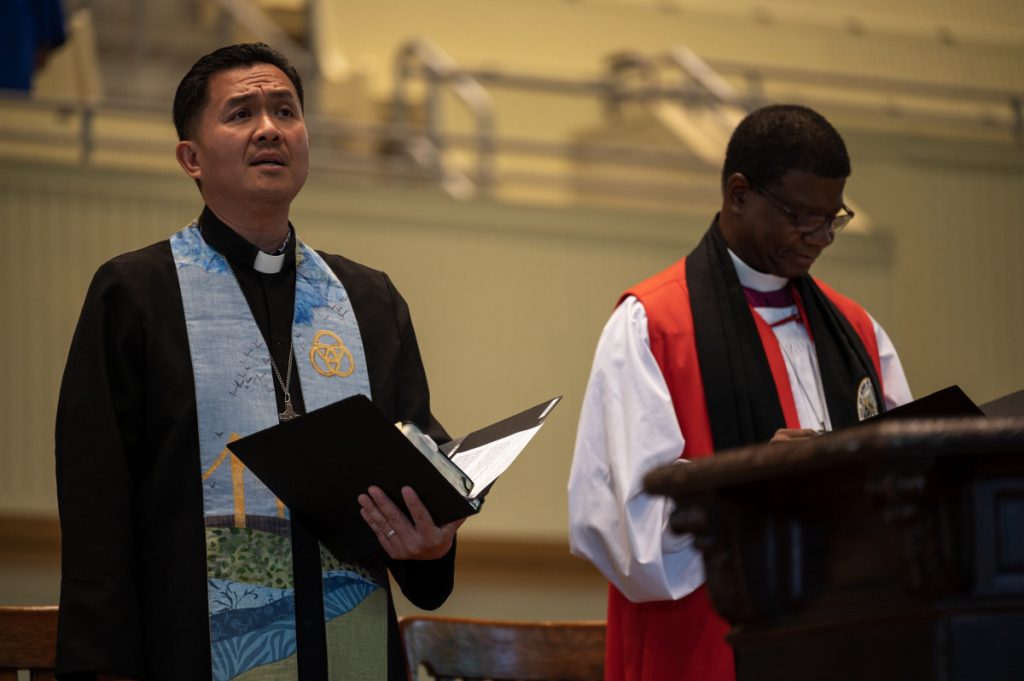
Column by Mary Lee Talbot
“It has been said that all epilogues are prologues. The conclusion of a story is never the end of the story, but the beginning of a new one,” said the Rev. Neal D. Presa. “We call graduation ‘commencement’ because graduation begins a new chapter. It is why pastors and ministers never really retire — we transition from one form of service to another.” Presa preached at the 9:15 a.m. Friday morning worship service in the Amphitheater. His sermon title was “Here But Not Yet.” The scripture was Revelation 22: 12-14, 17 and 20-21. The readings from Revelation, John’s apocalypse, are not about endings, Presa said, but about “God at work in the past, present and future all at once.”
First-century Christians faced persecution in the spiritual, political and economic realms. The power of love and compassion in the resurrection of Christ was placed against the power of Rome; might makes right. “People in house churches were challenging the values of the empire. Through their baptism and through their baptismal confession, ‘Jesus is Lord,’ they were challenging Caesar,” Presa said.
The problem for these early Christians was that even though Jesus rose, Caesar was still in Rome, Pilate was still in Jerusalem, Herod was still in Judea and Caiaphas was still head of the Sanhedrin. The power and victory of Christ was there, but where was it? Their faith said “He rose” and that was all that was needed to claim victory. Revelation offered hope in the midst of persecution. In Revelation 3:20, Jesus said, “Behold, I stand at the door and knock. … If you hear my voice and open the door, I will come in to you and eat with you, and you with me.”
Brian Blount, retired president of Union Seminary in Virginia and chaplain at the Presbyterian House for Week Three, calls this the “Eucharist connection,” when Jesus will feast and abide with the believers. “John’s benediction in Revelation is connected to the eucharist,” Presa said.
In the New Revised Standard Version, the benediction is translated “Amen! Come Lord Jesus.” The Greek word “marána thá,” can be translated as “O Lord, come!” In Aramaic, “māran ăthā,” it can be translated as “Our Lord has come.”
“This is either an invitation or a realized event. Whether it is anticipation or a reality, we invited the Lord to be present,” Presa said. “To say ‘Amen. Come Lord Jesus’ is inviting Jesus to be with all the saints; God invites all those seeking God that God will be near.” He continued, “When we pray ‘thy will be done on earth as is heaven,’ that is not wishful thinking, it is an invitation for Jesus to come in.”
When the Spirit of the Lord is present, Jesus is present even though physically absent. “The Spirit connects us to the Lord Jesus Christ in a powerful confession,” Presa said. “No matter what the world situation is, God is near.”
Jesus’ rising from the tomb and ascending to heaven doesn’t mean God’s love stops. “God gave his Son. not to condemn the world, but to save it. That is why we can pray, love and work to build a better world,” Presa said.
Loving God’s world doesn’t mean adopting its values but caring for the world. This love for the world includes “all the stuff that grates on us, makes us get on our knees and pray, protest with placards and write to members of Congress, makes us vote, compost and recycle, feed the hungry and befriend the friendless, advocate for human rights and bail reform, protect women and the vulnerable,” he said.
He continued, “Come, Lord Jesus. We need you in my family, in Chautauqua, in New York, in this nation, the world. Come to our homes, communities, neighborhoods, courhouses, legislative halls, executive office buildings, military installations, hospitals. Come to every nursing home, classroom, crackhouse, pharmaceutical company lab, brothel, prison cell, small business, grocery store, to the border, with LGBTQA+ people, every coastal city.”
Presa concluded, “Yes, come Lord Jesus Christ, in the way only you can come. Show you are Lord, show you are here. May our lives be a living benediction. The grace of the Lord Jesus Christ be with you, all the saints, all of you. Amen.”
The Rev. Natalie Hanson, co-pastor of Hurlbut United Community United Methodist Church and author of many of the prayers used in this week’s services, presided. Judy Rice, a former member of the Motet Choir and a refugee sponsor in Ellicott City, Maryland, read the scriptures. The prelude was “Flûtes,” from Suite du deuxième Ton by Louis-Nicolas Clerambault, played by Nicholas Stigall, organ scholar, on the Massey Memorial Organ. The anthem, sung by the Motet Choir, was “Be Still for the Presence of the Lord,” by David J. Evans, arranged by Indra Hughes. The choir was directed by Joshua Stafford, director of sacred music and Jared Jacobsen Chair for the Organist, and accompanied by Stigall. The postlude was “Toccata,” from Symphony No. 5, by Charles-Marie Widor, played by Stafford on the Massey Memorial Organ. Support for this week’s chaplaincy and preaching is provided by the Edmond E. Robb-Walter C. Shaw Fund and the Randell-Hall Memorial Chaplaincy.




